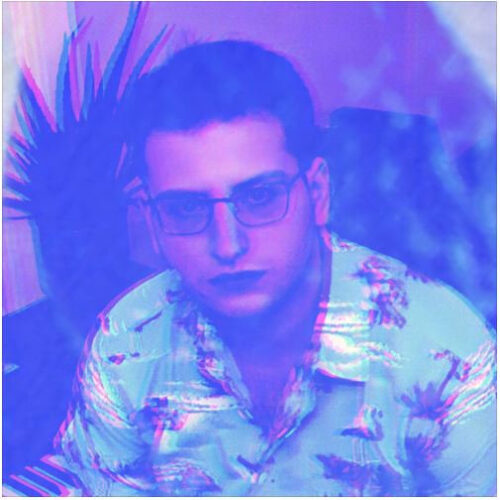
FFLLC is the the brainchild of electronic musician Jimmy Avgerinos. Their latest album “The Gift” is a vibrant collection of tracks that blend darkwave, synth pop, ambient and experimental sounds to create a brilliant listening experience.
I sat down with Jimmy to talk about his earliest musical experiences, the making of “The Gift” and his love for Vangelis soundtracks. Head over to the FFLLC bandcamp page to explore Jimmy’s music here.
What was the first music that really made an impact on you when you were a child?
As a child, my parents used to play a wide variety of songs on the family stereo; everything from NSYNC to Greek traditional music, jazz, and hip-hop. I gravitated towards various styles over the years, but was quite impressed by the “neo-psychedelia” that emerged in the mid-2000s indie rock scene. In attempting to learn how these bands made these sounds, I purchased an Alesis Micron synthesizer as my first piece of electronic gear. As far as artists that influenced me to start writing and recording my own music, I was extremely inspired by early MGMT and of Montreal, As I grew older and took music more “seriously”, I became obsessed with post-punk and new wave music.
When did you first start playing instruments and writing your own songs?
When I was young (8 years old) I started to take guitar lessons that I would persist with for many years… I hated it! It was beyond important to my understanding of theory, melody, and appreciation but as a kid I had no desire to learn! As a teenager, I began playing drums and would eventually become quite proficient. I am a much better drummer than guitar player! I have no training whatsoever with keyboards but I always had access to a piano at home and eventually taught myself enough chord shapes to get by. It is somewhat ironic, as I have exclusively used synthetic drum samples for a number of years now. I was writing my own songs by 13/14 and attempting to record them digitally, although I did not have the technical ability to capture my ideas. Due to a stubbornness to not ask anyone else for assistance, I would not gain the technical “know-how” until I was about 22/23 years old. I’m currently 28 and learning new tricks every time I start a recording session.
When did FFLLC start and what drove you in this latest musical direction?
FFLLC started (informally) while I was in college working on an unreleased album called “Art History”. It consisted of pop songs composed with the Alesis Micron, acoustic drums, and some guitar. I was playing music with some friends on various instruments but we were not accomplishing anything, committing almost nothing to writing/recording, etc. After a couple of years, I dove headfirst into the project by challenging myself to work exclusively with electronic instruments. At the time, this was done intentionally to grow away from the consensus, locally-pervasive “garage rock” sound that had been influencing my recordings. I had about 1 guitar-based song I was proud of compared to about 10 synth songs that I knew were more exciting and better produced. I was listening to a lot of John Maus at the time and tried to replicate the “post-punk” mood using electronics. Once I heard Maus, I realized that it was possible. I have several big influences, but the sound design of John Maus and the songwriting of Ariel Pink are two of the most important.
What was the writing and recording process like for your latest album “The Gift”? I love that a lot of the tracks are more sound collage based or like experimental sound bites. What was it like fusing all of these tones and textures together?
Thank you! It took me a lot longer to write and record as work, life, etc have gotten in the way. The collaging of tracks, synths, and samples is a direct result of another huge influence on me which is 18 Carat Affair. This most likely does not surprise anyone that has heard 18K’s music and my own, as there is a huge similarity. I like to believe that I convey a slightly different image through my sound, but I will never deny any sort of derivation. 18 Carat Affair really changed the way I listen to / appreciate / create music. I could go on for hours haha, the visual aspect of his work is/was quite influential. I had an opportunity to see his set twice in NYC and was blown away both nights by the audio and visual experience. We both exist within the “vaporwave” genre but I do not believe that to be an accurate descriptor of either of our projects. Not that the term is “dead” per se, but you will have a difficult time finding similar artists.
The process for recording and compiling these sounds involves collecting the samples and loading them onto a sampler. I will then play synths, sing, or re-sample over a constructed drum beat or a pre-recorded sample. It can get more in depth but essentially, I will reduce 4-6 hours of recorded material into a 30-40 minute release. I like working with shorter ideas, which serves both a technical and aesthetic purpose. A lot of consolidation occurs in the mixing process and I am often left without original “stems” or audio files after things are glued together.
If you could do a soundtrack for any film director who would it be and what would the film be about?
I would love to work on anything science-fiction related. Animated or live action. That would be a dream as a huge fan of Vangelis and the original Blade Runner. I’m also a fan of anime/manga, with the chief offender in this obsession being the Blame! manga by Tsutomu Nihei. Many of my releases are accompanied by sci-fi shorts on BandCamp written to accompany the release. “Luxury Eternal” and “Rouge Allure” both had science-fiction adjacent stories associated with their release. “Function & Form” has one as well although it is written in code…
What’s up next for you? Any new recordings/shows etc etc?
I’m working on an instrumental “new age” album about the desert, it is coming along nicely! This will most likely accompany another LP / follow up to The Gift. I am still working on a way to perform these songs live. There are several ways I can go about doing this, but I want to provide a good experience without rushing to the stage. As I mentioned earlier, I end up losing a lot of the “original” tracks when mixing, which complicates the performance aspect. It can still be done, but it needs to be quality controlled.







